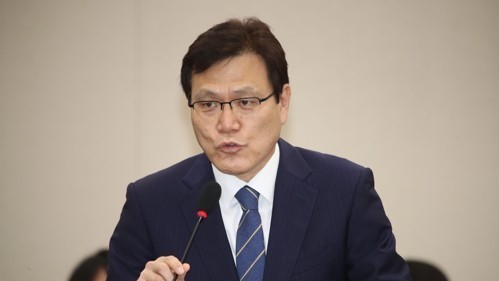The nominee for the nation's top financial regulator said Monday he would take "bold" steps in restructuring the petrochemical and steel sectors
Choi Jong-ku, a former deputy finance minister who served at the finance ministry for about three decades, was picked by President Moon Jae-in to head the Financial Services Commission.
If appointed, he will be tasked with slowing down the nation's mountain of household debt and restructuring some of the country's bloated business sectors.
Asked by lawmakers about government measures for restructuring the petrochemical and steel sectors, Choi replied during a parliamentary hearing, "Restructuring is a critical task."
 |
Top financial regulator nominee Choi Jong-ku speaks during a parliamentary hearing on July 17, 2017. (Yonhap) |
"I will instruct relevant creditor banks to take bold measures, if necessary, without overly clinging to small losses," Choi said.
The nominee said he would step up restructuring efforts for the nation's ailing shipbuilding and shipping sectors.
South Korea's household debt, already the highest among emerging markets, is nearing about 1,400 trillion won ($1,240 billion) this year.
Choi told lawmakers that he would "appropriately control" the pace of household debt growth.
Since early this month, the lending ceiling for homes located in areas designated by the government has been lowered from 70 percent to 60 percent of the property's value. The debt-to-income ratio has also been lowered to 50 percent from 60 percent.
Choi said the government will gradually introduce tougher rules for home-backed lending or the debt service ratio.
Currently, the local financial industry is advised to use the DSR, which reflects the share of income used to service debt, on a voluntary basis.
To protect the rights of consumers in financial markets, Choi said he would consider setting up a special consumer protection body under the commission.
Since March this year, Choi has served as president of the Export-Import Bank of Korea.
In South Korea, Cabinet appointments and certain key policy posts, such as the head of the FSC, are subject to parliamentary hearings although they do not necessarily require the approval of lawmakers to be appointed by the president. (Yonhap)







![[Today’s K-pop] Blackpink’s Jennie, Lisa invited to Coachella as solo acts](http://res.heraldm.com/phpwas/restmb_idxmake.php?idx=644&simg=/content/image/2024/11/21/20241121050099_0.jpg)
